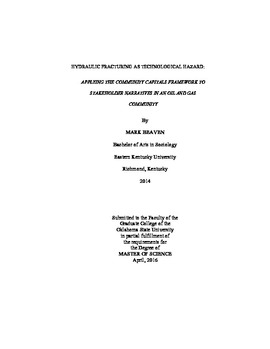| dc.contributor.advisor | Mix, Tamara | |
| dc.contributor.author | Beaven, James Mark | |
| dc.date.accessioned | 2017-02-22T22:13:47Z | |
| dc.date.available | 2017-02-22T22:13:47Z | |
| dc.date.issued | 2016-04-01 | |
| dc.identifier.uri | https://hdl.handle.net/11244/49044 | |
| dc.description.abstract | The current literature on hydraulic fracturing is largely survey based, addressing public assessments of the technology in broad strokes. This study draws on pertinent studies in disaster literature and the community capitals framework, to employ qualitative methodologies to gain an in-depth understanding of how extraction related technological innovations are affecting a rural Oklahoma community. Data for this research consist of 33 semi-structured interviews with community stakeholders, 146 local newspaper articles and editorials, and field notes of community-based meetings. Interviews and articles were coded and analyzed using the community capitals framework. Results consider the existence of multiple cultural capitals within the community, which also correspond to how stakeholders construct risk associated with nearby oil and gas activity. | |
| dc.format | application/pdf | |
| dc.language | en_US | |
| dc.rights | Copyright is held by the author who has granted the Oklahoma State University Library the non-exclusive right to share this material in its institutional repository. Contact Digital Library Services at lib-dls@okstate.edu or 405-744-9161 for the permission policy on the use, reproduction or distribution of this material. | |
| dc.title | Hydraulic Fracturing as Technological Hazard: Applying the Community Capitals Framework to Stakeholder Narratives in an Oil and Gas Community | |
| dc.contributor.committeeMember | Gill, Duane | |
| dc.contributor.committeeMember | Whitham, Monica | |
| osu.filename | Beaven_okstate_0664M_14585.pdf | |
| osu.accesstype | Open Access | |
| dc.description.department | Sociology | |
| dc.type.genre | Thesis | |
| dc.type.material | text | |
